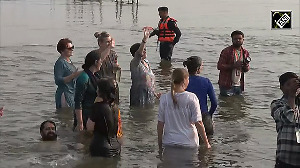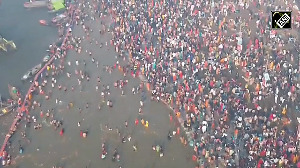Hundreds of shivering fans queued outside a soccer stadium in the early morning cold on Wednesday, hours before a World Cup qualifier between bitter rivals Japan and North Korea that is being played amid a security clampdown.
The battle for a berth at the 2006 World Cup soccer tournament comes as the relationship between the two, long uneasy because of Japan's often brutal colonisation of the Korean peninsula, has been further strained by Pyongyang's admission that it kidnapped Japanese citizens decades ago.
Many in Japan feel that North Korea has not fully accounted for the abductees and Japanese officials, worried that the bad blood may spill into sport, have been calling for calm ahead of the match.
"This is entirely a sports matter and separate from political issues," Japan's top government spokesman, Hiroyuki Hosoda, told a regular news conference. "We are hoping that the match will take place peacefully in a spirit of sportsmanship."
Most members of the mystery-shrouded North Korean soccer team belong to the army's "4.25" squad, named for the founding date of the Korean People's Army. However, two J-League pros from Japan's North Korean resident community have also been included.
Nearly four decades after the North's stunning quarter-final appearance at the 1966 World Cup in England, the team is hoping to reclaim the Asian limelight won by South Korea with its fourth-place finish in 2002. Japan lost to Turkey in the second round of the 2002 tournament.
The kickoff is at 1600 IST, but hundreds of fans, watched by helmeted police, had lined up eight hours before to enter the 63,700-capacity stadium early and take the best seats.
Japan and North Korea are in a qualifying group along with Iran and Bahrain, from which the top two teams will qualify directly for the finals in Germany. Each team in the group plays the others twice, home and away, and the return Japan-North Korea game is scheduled to be held in Pyongyang in June.
INTENSIFYING FEUD
The abductees issue has become an emotive one for many Japanese, already nervous about Pyongyang's nuclear and missile programmes, since North Korean leader Kim Jong-il admitted his agents had kidnapped 13 Japanese in the 1970s and 1980s.
Five abductees have returned, but Tokyo is pressing for better information about the fate of eight who Pyongyang has said are dead and another two Japan believes were also kidnapped.
The feud has intensified since November, when Tokyo said DNA tests showed bones handed over to Japanese diplomats were not those of the abducted Japanese citizens.
Pyongyang accused Tokyo of fabricating the test results and calls are growing among the Japanese public and lawmakers for sanctions against the North's impoverished economy.
Nearly 3,500 police and security officials are being mobilised for the match. Other precautions will include a buffer zone of empty seats in the stadium to keep an expected crowd of several thousand North Korea supporters apart from Japanese fans.
Some officials worry that members of right-wing Japanese groups might attack North Korea fans or boo loudly when North Korea's national anthem is played at Wednesday's match.
Chinese fans booed Japanese players at an Asian Cup match last year in China, where resentment of Japan is also common. China fans rioted after Japan won.
Many Japanese fans, though, hope for a spirited but friendly match. "There are various political issues, but I hope it will be played in the sort of atmosphere where the players can exchange uniforms when it's over," one fan told a TV reporter.
Most of those cheering for the North Korean team will be pro-North Korean residents of Japan. Like those who lean towards South Korea, many of Japan's estimated 150,000 pro-North Korea residents are descendants of students and workers who came or were forcibly brought to Japan while Korea was a Japanese colony.







 © 2025
© 2025